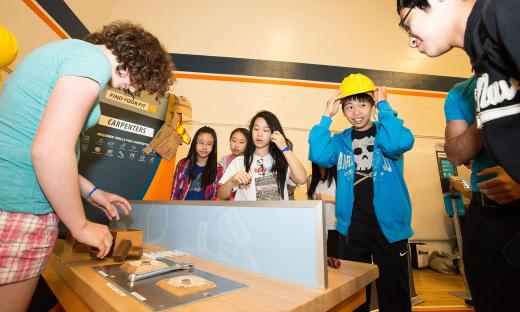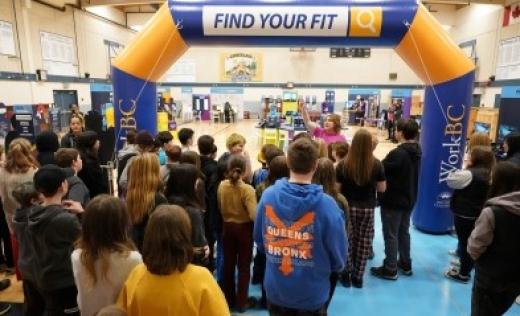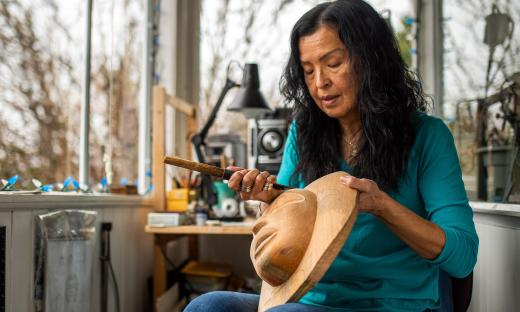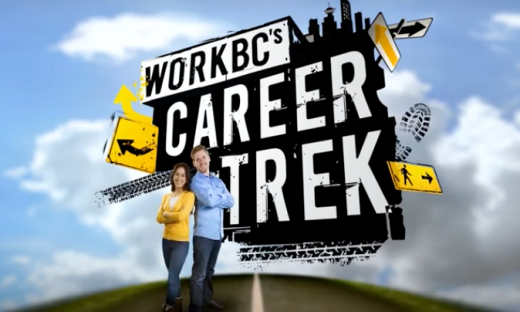This learning activity provides an opportunity for students to take six self-assessment quizzes, reflect on their current career choice and reconfirm their next steps on their career journey.
The Career Discovery Quizzes learning activity provides students with a chance to do a reality check of their career plans. Six quizzes are available and provide career matches based on abilities, work preferences, subjects of interest and lifestyle choices. Students can take the quizzes and do the research prior to gathering materials for setting post-graduation goals and their capstone project. Through Career-Life Education (CLE) and Career-Life Connections (CLC), it’s likely the student has a notional career path in mind and has chosen courses in that direction. The student may already be apprenticing, working, or volunteering to gain experience in their area of interest. Each of these activities encourages students to cultivate and engage with personal networks to expand their understanding of the world of work.
Worksheet A (available for download)
Other Requirements: Computer, tablet, smartphone, or notepaper to record information, and previous career planning documents with results of interest quizzes, career choices, etc.

Take the quizzes yourself so you know what to expect.
- When you took the six Career Discovery Quizzes, a list of career options was suggested. Were any of those careers the same ones you already identified as preferred career choices, during your previous career planning and exploration activities?
- If your preferred career options were not among the list of suggested careers, were you surprised? Did you explore these suggested career options?
- After taking the six Career Discovery Quizzes, did you reflect on the relationship between school subjects, personal attributes, interests, work values and career options? Did this help you make new connections or think further about career options?
- When you looked at the suggested careers, were you surprised at where the jobs would be located? Are there jobs available in your region, or would you have to consider moving to find work?
- For your preferred careers, are you taking the courses now to set you on a pathway toward careers that interest you?
- If you think you may change career direction, are there any additional courses you need to take to get the prerequisites needed?
- As a result of your investigation, what are the next steps you want to take in planning and preparing for your career?
- How do self-awareness and knowledge of skills, talents and challenges contribute to career-life choices?
- What information do you want to keep for your capstone project?
In this learning activity, students will have a chance to do a reality check of their plans. They can do this prior to pulling together material for creating post-graduation goals and their capstone project. Through
Career-Life Education (CLE) and Career-Life Connections (CLC), it’s likely that the student has a career path in mind and has chosen courses in that direction. The student may already be apprenticing, working or volunteering to gain experience in their area of interest. Each of these activities encourages students to cultivate and engage with personal networks to expand their understanding of the world of work.
The Career Discovery Quizzes resource gives students a chance to expand their comfort zone and dig into aspects of their chosen career pathway that they have not previously considered. The quiz results allow them to reflect on and assess whether their current career pathway choice matches their abilities, work preferences, subjects of interest and aspirations for the future. Students can also explore B.C. regions where they could work and live. They can consider if they want to proceed with their chosen career path or if they need to reconsider their direction and explore or planning further.
Building on the results of their career education learning activities from Grade 8-12—with career research and planning as the starting point—students can update their understanding of how school subjects, personal attributes, interests, work values and lifestyle choices influence their career options. This will provide a good opportunity to reflect on their current career choice and confirm their next steps on their career journey.
Ask students to bring to class the career research they have completed to date related to career exploration and course planning. If they do not have any documents, ask them to write down their courses, why they chose them and what they had in mind for a potential career option.
- Lead a discussion about career planning activities to date to see where they are at in terms of career readiness.
- Ask students to reflect on their preferred career option(s) and why they chose them.
- Ask students why they think it’s the right choice.
- Answers will vary:
- Some students will still be keen on their choice. Ask them how they know for sure.
- Others will wonder what on earth they were thinking. Ask them what changed and influenced their change in perspective.
- Some will think it may not be a good idea but are unsure. Remind them that they can reconsider their plans at any time.
- Do they know anyone who changed their mind midway through their career? (As a teacher, can you share some examples of people you know who made some changes? For example: because the person wanted to live somewhere else or wanted a career that better matched their interests or abilities?)
- Introduce the Career Discovery Quizzes resource by giving them a live demonstration of how the assessment can be used to “double-check” their thinking on their proposed choice.
- Highlight that many people who consider themselves successful have strong connections between their career pathway(s) and their personal attributes, interests, work values and lifestyle preferences.
The next part of the learning activity will allow students to reflect on their future career choices. As part of Career-Life Education and Career-Life Connections they will likely have done several self-assessments looking at personality, interests, work values and lifestyle preferences, so they should have those at hand.
This part of the learning activity will require the use and navigation several sections of the Career Discovery Quizzes tool along with various WorkBC career tools. Students will record their findings on the Career Discovery Recording Sheet. Then, in the final part of the learning activity, they can reflect on their current choice.
Review the three steps to the learning activity using the Career Discovery Recording Sheet. Students will use the Recording Sheet as a guide to explore their current career choice and to compare it with other possible career options. Teachers can do a live demo of Career Discovery Quizzes while they review these steps:
Step One
- Using the Career Discovery Recording Sheet, complete the information in “current career choice.” If they need to find additional information, search the career in Explore Careers.
Step Two
- Take the six quizzes to identify if there are other career options that are presented as options that match their personal attributes.
- Remind them be as accurate as they can be about the kinds of things that interest them. By doing so, they will find a potential career that better reflects who they are.
- If the resulting career choices do not match up with what students had identified during their previous career education research, that is fine. That is what career exploration is all about.
Step Three
Ask students to:
- Browse through the information on the various career options that are presented to them.
- Narrow down their options to two career choices that appeal most to them and answer the questions in the Career Discovery Recording Sheet.
- Ask students to answer the reflection questions.
- Encourage students to think critically about their options and opportunities when answering the reflection questions, to check that they are on the right track.
- Ask students to pair and share their learning with a partner.
Self-Assessment
Ask students to provide evidence of the statement:
- By taking the Career Discovery Quizzes, I confirmed or revised my career options to match my abilities, work preferences, school subjects, personal attributes, interests and lifestyle choices.
- I created a personalized electronic record of my findings and of the most useful information for when I start creating my post-graduation plans.
Teacher Assessment
Teacher reviews the reflection questions to gauge if students need to do additional research to support their career choices
This lesson plan supports elements of British Columbia's Career Education Curriculum as outlined below. For further details on the curriculum itself, visit the Ministry of Education's Career Education Curriculum webpage.
Career-Life Education (CLE)
- Career-life choices are made in a recurring cycle of planning, reflecting, adapting and deciding.
- Career-life decisions are influenced by internal and external factors, including local and global trends.
Career-Life Connections (CLC)
- Career-life development includes ongoing cycles of exploring, planning, reflecting, adapting and deciding.
CLE
- Career-life development:
- Self-assessment and reflection strategies.
- Career-life planning:
- Career-life development research.
- Methods of organizing and maintaining authentic career-life evidence.
CLC
- Career-life planning:
- Self-assessment to achieve goals that advance preferred career-life futures.
CLE
- Experience: Explore and connect experiential learning both inside and outside of school with possible and preferred career-life pathways.
- Initiate: Explore and reflect on career-life roles, personal growth, and initial planning for preferred career-life pathways.
- Initiate: Develop preliminary profiles and flexible plans for career-life learning journeys.
CLC
- Examine: Assess personal transferable skills and identify strengths and those skills that require further refinement.
- Experience: Explore possibilities for preferred personal and education/employment futures, using creative and innovative thinking.
- Experience: Identify and apply preferred approaches to learning for ongoing career-life development and self-advocacy.
- Experience: Engage in, reflect on and evaluate career-life exploration.
- Critical thinking.
- Communication.








